-
 +33 +8
+33 +8A Shipwreck, 500 Years Old, Appears on the Baltic Seabed
Its condition is pristine, but its identity is a mystery. For now, maritime archaeologists call it Okänt Skepp, Swedish for “unknown ship.”
-
 +4 +1
+4 +1If this type of dark matter existed, people would be dying of unexplained ‘gunshot’ wounds
Dark matter, the mysterious substance that makes up most of the mass of the universe, has proved notoriously hard to detect. But scientists have now proposed a surprising new sensor: human flesh. The idea boils down to this: If a certain type of dark matter particle existed, it would occasionally kill people, passing through them like a bullet. Because no one has died from unexplained gunshotlike wounds, this type of dark matter does not exist, according to a new study.
-
 +23 +5
+23 +5Reimagining the Megalodon, the World's Most Terrifying Sea Creature
When I reached the world’s pre-eminent sculptor of long-dead monsters, he was standing atop a ladder inside a 16-foot-tall section of a megalodon tail that was propped upright in his warehouse-size studio. “I’m sorry if it sounds like I’m inside a bathroom,” Gary Staab said on his cellphone. The tail was part of a 52-foot-long, life-size model of the prehistoric shark that Staab was custom-building for the Smithsonian’s National Museum of Natural History.
-
 +20 +2
+20 +2IU researchers synthesize a molecular 'cage' to trap chloride salts
The technology could address the seepage of this pollutant into freshwater systems, which is a threat to drinkable water across the globe.
-
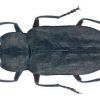 +35 +7
+35 +7How a Half-Inch Beetle Finds Fires 80 Miles Away
Fire chaser beetles' ability to sense heat borders on the spooky
-
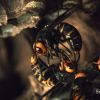 +7 +1
+7 +1Two Giant Killer Hornet Colonies Battle to the Death
A giant killer hornet war is waged between two colonies, and the resources, territories, and survival of a new generation are at stake. Watch the battle unfold as these huge hornets risk their lives for their kingdoms.
-
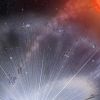 +9 +1
+9 +1Secrets of solar system formation revealed by cosmic dust
A tiny grain of stardust — older than the solar system itself — sheds light on how planetary systems like ours form. A microbe-sized particle — a graphite grain originating from a nova explosion which occurred over 4.5 billion years ago — has been liberated from a meteorite collected in Antartica by NASA. The grain has been studied down to the atomic level by researchers from the University of Arizona and the University of Toronto. Jane Howe, an engineering professor at the latter institute explains: “This grain is presolar. It originated before the formation of the sun.
-
 +4 +1
+4 +1'Lost' book of exquisite scientific drawings rediscovered after 190 years
Lost for 190 years, a three-volume manuscript blooming with vivid color drawings of Cuban flora has resurfaced in upstate New York. Nondescript marbled cardboard covers and a title page in cursive handwriting announce Specimens of the Plants & Fruits of the Island of Cuba by Mrs. A.K. Wollstonecraft. This simplicity belies the contents of the slim, well-worn volumes. Pages and pages contain 121 illustrated plates showing plants such as red cordia sebestena, deep purple Lagerstroemia, and white angel’s trumpet in consummate detail.
-
 +13 +5
+13 +5What gravitational waves can say about dark matter
In 1916, Albert Einstein published his theory of general relativity, which established the modern view of gravity as a warping of the fabric of spacetime. The theory predicted that objects that interact with gravity could disturb that fabric, sending ripples across it. Any object that interacts with gravity can create gravitational waves. But only the most catastrophic cosmic events make gravitational waves powerful enough for us to detect.
-
 +29 +4
+29 +4Quantum breakthrough could lead to 'super-powered' hard disk drives
While the world’s focused on the latest Avenger’s flick, an international team of scientists have potentially unlocked the super powers of another familiar Marvel character: Magneto. Researchers from the Argonne National Laboratory, Oakland University in Michigan, and Fudan University in China have discovered a quantum-level exploit that has the potential to give engineers greater control over the magnetic properties of certain metals.
-
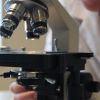 +4 +1
+4 +1Scientists find new state of matter which is both solid and liquid at the same time
It turns out that solid, liquid and gas isn’t the whole story – after scientists found a new state of physical matter… where atoms are both solid and liquid at the same time. When you apply extreme pressure and temperature to potassium, it can form a state in which most of the atoms form a lattice structure – but a second set are in a fluid arrangement. Andreas Hermann of the University of Edinburgh siad, ‘It would be like holding a sponge filled with water that starts dripping out, except the sponge is also made of water.
-
 +16 +2
+16 +2Empathy is the secret ingredient that makes cooperation – and civilization – possible
Human societies are so prosperous mostly because of how altruistic we are. Unlike other animals, people cooperate even with complete strangers. We share knowledge on Wikipedia, we show up to vote, and we work together to responsibly manage natural resources. But where do these cooperative skills come from and why don’t our selfish instincts overwhelm them? Using a branch of mathematics called evolutionary game theory to explore this feature of human societies...
-
 +4 +1
+4 +1The Lost History of One of the World’s Strangest Science Experiments
Before dawn on April 4, 1994, Abigail Alling and Mark Van Thillo slipped across the foothills of Arizona’s Santa Catalina Mountains. They made their way to a looming monument of geodesic domes and pyramids known as Biosphere 2. The three-acre complex contained a miniature rain forest, a mangrove, a desert and a coral reef — along with seven people who had been sealed inside for a month. Ms. Alling and Mr. Van Thillo had recently emerged from a two-year stay in Biosphere 2.
-
 +4 +1
+4 +1Young Astronomer Uses Artificial Intelligence To Discover 2 Exoplanets
A team of astronomers led by an undergraduate student in Texas has discovered two planets orbiting stars more than 1,200 light-years from Earth. Astronomers already knew of about 4,000 exoplanets, so finding two more might not seem like huge news. But it's who found them and how that's getting attention. Anne Dattilo, a senior at the University of Texas, Austin, found the planets by using an artificial intelligence program to sift through a mountain of data collected by NASA's Kepler space telescope. By using AI, the 22-year-old is helping to usher in a new era in astronomical research.
-
 +21 +3
+21 +3Galaxy Simulations Offer a New Solution to the Fermi Paradox
As far as anyone knows, we have always been alone. It’s just us on this pale blue dot, “home to everyone you love, everyone you know, everyone you ever heard of,” as Carl Sagan so memorably put it. No one has called or dropped by. And yet the universe is filled with stars, nearly all those stars have planets, and some of those planets are surely livable. So where is everybody?
-
 +18 +3
+18 +3Death
We are all going to die! In physiological terms the deaths that all will die will be broadly similar, in the sense that either suddenly and unexpectedly or maybe over a long period of time, the systems that keep us active and sentient will cease to function. However, throughout the world, people make important distinctions between a body that has expired and a dead person; that is, as someone who is connected to others through complex social relations which bring into question any simple notion of a finite ending.
-
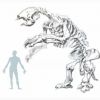 +3 +1
+3 +127,000-year-old fossil reveals what life was like for a giant ground sloth, study says
They were big, hairy and freaky-looking, and now we know much more about the world that giant ground sloths lived in 27,000 years ago, a new study reports.
-
 +3 +1
+3 +1Don’t panic: Lessons learned from Hawaii false alarm
When people in the Hawaiian Islands received a false alarm text message that said “Ballistic missile threat inbound to Hawaii. Seek immediate shelter. This is not a drill” in January 2018, the result was not panic, according to new research from the University of Georgia. A team of researchers analyzed the unprecedented event—a text that was announced as a false alarm 38 minutes later—to better understand how people react in the face of a potentially catastrophic event.
-
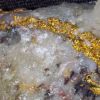 +3 +1
+3 +1Earthquakes Make Gold Veins in an Instant
The process takes place along ‘fault jogs’ — sideways zigzag cracks that connect the main fault lines in rock, says first author Dion Weatherley, a seismologist at the University of Queensland in Brisbane, Australia. When an earthquake hits, the sides of the main fault lines slip along the direction of the fault, rubbing against each other. But the fault jogs simply open up. Weatherley and his co-author, geochemist Richard Henley at the Australian National University in Canberra, wondered what happens to fluids circulating through these fault jogs at the time of the earthquake.
-
 +25 +5
+25 +5Spectacular Hubble Image Shows a Galaxy That Lost Its Spiral Arms
A new study led by Yale University astronomers tells the story of a galaxy that ran out of gas. It’s a story as old as the universe itself: A galaxy is born, brimming with new stars, its spiral arms stretching and curving. But then it runs into trouble, veering too close to the center of a nearby galaxy cluster. The surrounding cluster begins to siphon off the galaxy’s star-making gas, until it loses its spiral arms and becomes a dead relic.
Submit a link
Start a discussion




















